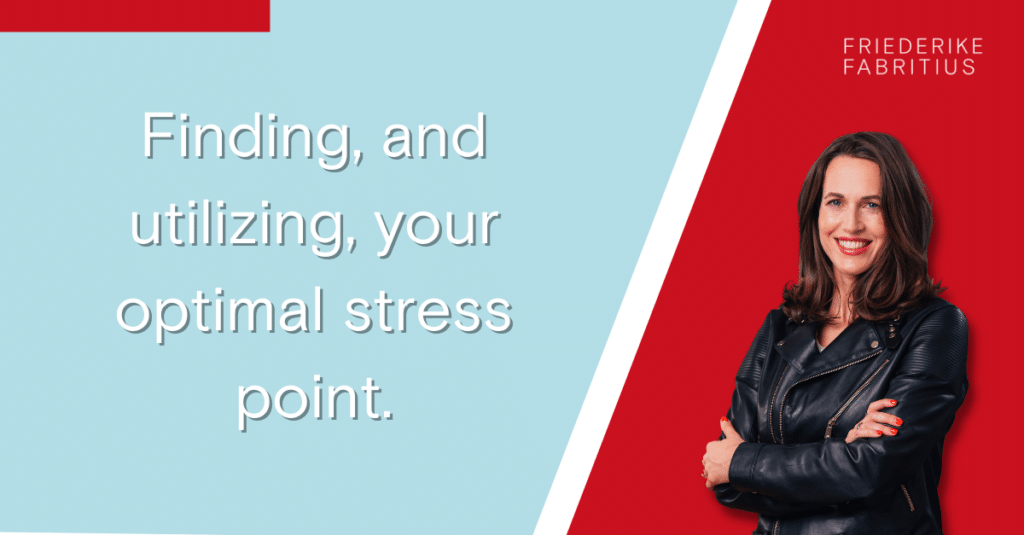Finding, and Utilizing, Your Optimal Stress Point
Yes, optimal stress points – there really is such a thing!
Because we each have our own unique neurosignature, we also each have an individual optimal stress point at which we work best. It’s that magic point when you’re working on a project and everything seems to flow naturally. Where thinking and ingenuity come easily, and you lose all sense of time, being fully present and focused on the task at hand. You have no doubt experienced this before, but where does it come from?

Just outside the comfort zone
Our optimal stress point occurs when you are just slightly over-challenged; it’s when you are pushed right outside the edge of your personal abilities. That little bit of fear that you get when you’re nervous about a presentation, or when you’re hosting a dinner party for the first time, that’s the “good” stress that’s going to push you to focus and deliver at your best! We need to experience fun to get into flow, and a little bit of fear is just the trick we need to get there.
Finding the balance between fear and overwhelm
Finding the right balance can be tricky, but once it’s done correctly – the payoff is immense! When you feel that little bit challenged, your brain starts to release norepinephrine. You know that feeling you get after you jump into a cold body of water, or the laughter and smiles that can come over some of us when we’re on a fast rollercoaster? That’s norepinephrine, the positive “fear” chemical, kicking into high gear and giving you a little boost!
It’s this boost that is going to help you think faster, react quicker, and rise to the challenge at hand. Our prehistoric ancestors benefitted from this neurochemical when they were worried about defending their homes and family from wild animals or other attacks, and now we get to benefit from it during our 21st-century stresses – even if they may be a little less life-threatening.
The brain is a lazy, couch potato
Your brain wants to do 1 thing while conserving as much energy as possible: keep the body (you) alive. Because of this, your brain is not going to reach its full potential unless it is pushed to do so! If you’re not feeling a bit challenged at work, you will likely get bored and apathetic, and you won’t be able to focus. You will certainly not be able to deliver your best.
Your best performance isn’t when your skill level is perfectly in line with the task at hand
The point at which you feel challenged, focused, but not overwhelmed is your own personal optimal stress point. Once we understand that we all are going to need a different amount of fear (or stress/norepinephrine-inducing situations – however it helps to think about it) to reach this state of flow, we start to understand how we can support ourselves and others to reach our peak performance!
Folks who have high-testosterone/dopamine neurosignatures tend to do better, and sometimes even thrive in higher-stress situations than their high-estrogen/serotonin counterparts. It has nothing to do with talent or skill that they typically work better under pressure, but rather that their brains are just more stress resistant – they need more stimulation to be pushed past their optimal stress point. We can’t expect everyone to thrive in the same environment.
Understand how to work with optimal stress points
For managers, as well as team members, it is important to embrace the uniqueness and diversity of each person with whom we are working alongside. When we think about it this way, understanding optimal stress points is a critical part of that! Allowing people the flexibility and the autonomy to work the way they like to work – whether in-person, with headphones on, late at night, or on a tight deadline – will allow them the opportunity to work within their optimal stress point, and not beyond it. When our team members are supported in doing their best work – in the way they most enjoy doing it – they will consistently deliver their strongest results! For some people this entails reducing stress levels, for others, increasing them.
Are you currently working at your optimal stress point? If not, do you need a little more or less fear to get there? How can we make that happen? I’d love to know!
Want more brain-friendly tips?
Check out my Wall Street Journal bestselling book, The Brain-Friendly Workplace: Why Talented People Quit and How to Get Them to Stay. And if you felt inspired, please leave an Amazon review. I read every single one and would love to see yours there!
I also offer virtual keynotes to provide companies with science-based insights that you can put into practice immediately in order to work and live smarter, better, and happier. Find out more about my keynotes here.
And if your friends or colleagues would benefit from monthly brain-friendly tips, please click here to share this newsletter with them. Be sure to sign up for my email newsletter as well!